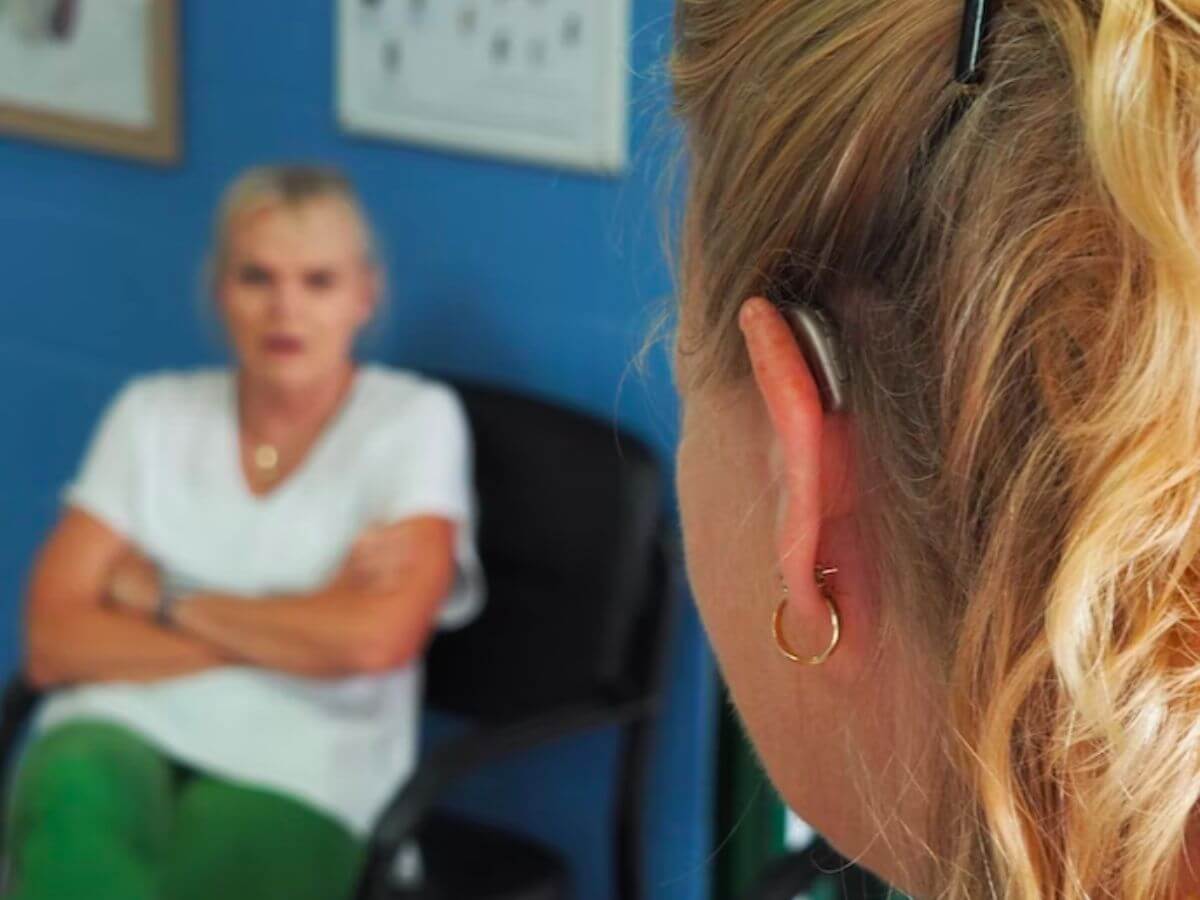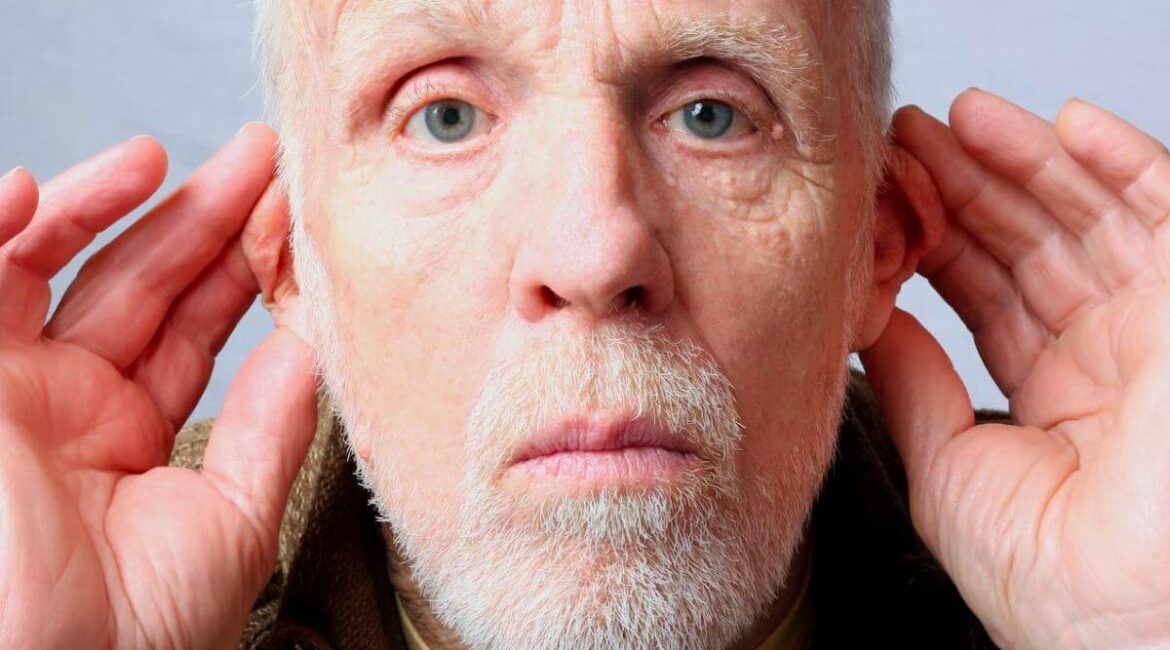Do people who need hearing aids speak louder than people with normal hearing? It’s a common misconception that hearing aid users must raise their voices to be heard.
People with hearing loss don’t necessarily have to raise their voices in order to be heard. In fact, talking too loudly can strain vocal cords and cause discomfort or pain for those with certain types of hearing loss.
People with hearing aids can adjust their devices to the best setting for them and often find that they don’t need to talk any louder than normal.
Additionally, many modern types of hearing aids allow users to filter out background noise so they can better understand conversations without raising their voices.
Listening to Your Own Voice With Hearing Aids
Your voice may sound funny the first time you speak after turning on your hearing aids. It could have an unnervingly booming quality, a hollow or tinny sound, or both.
In this situation, describe to the hearing care provider how your voice sounds. They can make specific changes to make your voice sound more natural.
It would be best if you eventually started to become accustomed to the sound quality of your hearing devices after a time of adjusting. This includes being able to hear your voice using hearing aids. But if you’re still unsatisfied with how you sound, consider returning to the hearing care professional and asking for further changes.
The first thing to remember if you don’t like how your voice sounds while wearing hearing aids is that it will pass. It won’t seem unusual to you for long if you get used to the sound of your voice.
We advise reading aloud to yourself in a peaceful place, such as your home or a favourite nearby park, to hasten this process.
If you use your hearing aids continuously during your whole waking day, you should become accustomed to the sound of your voice after just a few minutes a day for a week or two.
Everything Is Too Loud With Hearing Aids
It is simple to be primarily oblivious to some noises that are no longer audible when hearing loss occurs gradually.
The first-time user of a hearing aid may suddenly become aware of all the sounds, many of which they may not have heard in years. Because of this, novice users can grumble that ‘everything is too loud’.
A knock at the door or a ringing phone may be instantly recognised noises, whereas other sounds, such as a kettle boiling or a faucet running, may take some time to identify.
At first, these sounds could seem almost intolerable, and you might need to talk louder to make up for your experience of being in a noisy atmosphere. You may occasionally speak too loudly.
Hearing Aids Voice Volume Is the Main Reason

The sound of their voice may be the most significant alteration for some people. Your voice may come off as strange or humorous, as well as louder than you’d prefer.
Swallowing and chewing may be particularly obvious. The longer you use your hearing aids, these initially bothersome feelings will lessen.
Here are some useful tips for controlling your voice’s volume so that you can communicate more effectively and avoid straining your vocal cords.
1. Wear Them at Home First
To begin with, use your hearing aids at home or in other peaceful listening areas. Put your attention on one-on-one interactions.
Inform your friends and family about your new hearing aids so they may support your commitment to better hearing when you wear them in circumstances that are more difficult for you to hear in.
You may also familiarise yourself with your voice by reading aloud or chatting with your pet.
2. Give Yourself Homework
Try to identify the origins of all the noises in your area to get more experience with your hearing aids. You may also use your alone time at home to listen to audiobooks or talk radio.
3. Take Breaks
Wear them for a few hours on the first day, then for a few more each subsequent day. Increase your daily wear time and the circumstances in which you wear them gradually.
4. Attend Follow-up Visits
You should schedule as many follow-up appointments as necessary with your hearing care specialist to fine-tune the sounds you’re hearing, modify the fit in your ear, and discuss your most challenging scenarios.
Most patients return to their audiometrist two weeks following their initial fitting to have their devices adjusted and maybe fine-tuned.
5. Take Classes on Hearing Aid Maintenance
Make sure to sign up for any orientation seminars your hearing care specialist may be offering for new hearing aid users. These courses are highly beneficial and increase hearing aid users’ contentment.
6. Anticipate Some Frustration, Especially With Background Noise
Hearing aids can be a bit of a sound overload if you haven’t heard well in a while since they flood your ears with noises you weren’t previously aware of. For instance, background noise like the refrigerator’s buzzing could sound extremely loud or intolerable.
This results in your brain losing the ability to distinguish between different noises and background noise.
It’s crucial for people who are adjusting to a new hearing aid to be patient and take it slow while their brains change since they have to retrain how to ignore background noise.
7. Report Any Pain
Depending on your hearing requirements, you may have custom-fitted earmolds, which should comfortably fit inside your ears. Hearing aids can initially create a small amount of discomfort.
Still, if this tenderness progresses to any degree of ear pain, the hearing specialist should be contacted immediately to address the issue.
Because they are soft on the ear canals and don’t induce a ‘blocked up’ feeling in the ears like earmolds may, Receiver-In-The-Ear or RITE models with domes are frequently more straightforward to adapt to.
Read more: Types of Hearing Aids.
Adjusting to Life With Hearing Aids in Singapore

Adjusting to life with hearing aids can be a challenge. For most, it is an unexpected change that needs immediate adjustment in order to maintain quality of life.
It takes time for people who wear hearing aids to get used to them, but understanding the process and its importance makes it easier for many.
If you have recently been diagnosed with hearing loss, or if you are exploring treatment options for the first time, you may be feeling a range of emotions. It is natural to feel apprehensive or even afraid about what life will be like with hearing aids.
However, it is important to keep in mind that millions of people around the world live happy, successful lives with hearing aids every day.
There is no need to feel ashamed or embarrassed about wearing them – in fact, many people find that their quality of life improves significantly once they start using hearing aids.
If you are considering treatment for hearing loss, don’t hesitate to reach J Glasses & Hearing, the leading provider of hearing aids in Singapore. Book a free hearing test with us today and take the first step towards better hearings!

